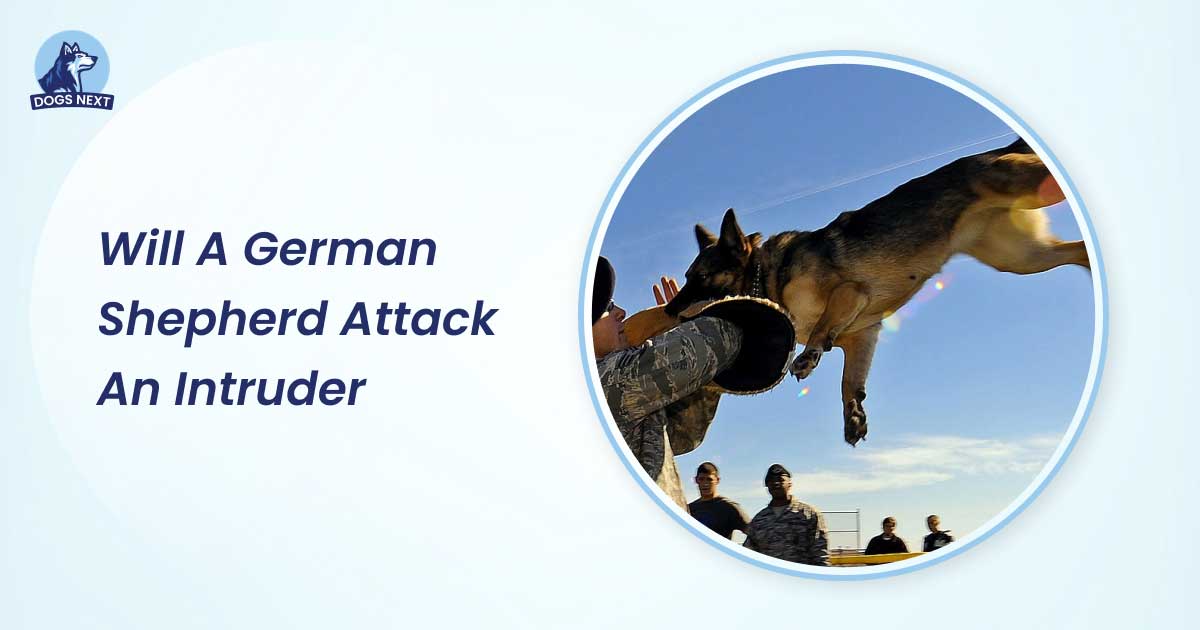Yes, a German Shepherd might attack an intruder. They are protective and loyal dogs.
German Shepherds are known for their strong protective instincts. Their loyalty to their family makes them reliable guard dogs. They often act to keep their loved ones safe. German Shepherds are intelligent and can be trained to protect and follow commands.
Whether they will attack an intruder can depend on their training and the situation. Understanding their nature and behavior is important. This blog will explore the factors influencing a German Shepherd’s actions when faced with an intruder. Let’s dive into the reasons behind their protective behavior.
Natural Guarding Instincts Of German Shepherds
German Shepherds are known for their loyalty and intelligence. They are often used as police and military dogs due to their strong natural guarding instincts. This breed is highly protective of its home and family, making them excellent guard dogs. But will a German Shepherd attack an intruder? Understanding their natural guarding instincts can help answer this question.
Instinct To Guard Home And Family
German Shepherds have a strong instinct to guard their home and family. This breed is naturally suspicious of strangers and will often become alert when someone unfamiliar approaches their territory. Their guarding instincts are deeply ingrained, making them vigilant and protective.
Here are some key aspects of their guarding behavior:
- Alertness: German Shepherds are always on the lookout for potential threats. They have a keen sense of hearing and smell, allowing them to detect intruders quickly.
- Loyalty: This breed is incredibly loyal to their family. They form strong bonds and will go to great lengths to protect their loved ones.
- Territorial behavior: German Shepherds are very territorial. They will often patrol their home and yard, ensuring that no intruders enter their space.
Their natural guard dog response includes barking to alert their owners of potential threats. They may also position themselves between their family and the intruder, showing a readiness to protect. This behavior is a clear indication of their German Shepherd guard instincts and their commitment to protecting family from intruders.
Respond With Assertiveness
When faced with an intruder, a German Shepherd will respond with assertiveness. This breed is not known for being aggressive without reason, but their protective nature can make them formidable guardians.
Here are some ways a German Shepherd may respond assertively:
- Barking: A loud and deep bark is often the first sign of their natural guard dog response. This serves as a warning to the intruder and a call for the owner’s attention.
- Stance: German Shepherds will adopt a firm and confident stance. They may lower their head and raise their hackles, showing they are ready to defend their territory.
- Posturing: The dog might growl or show its teeth to intimidate the intruder. This is often enough to deter anyone with ill intentions.
In extreme cases, if the intruder poses a direct threat, the German Shepherd may attack to protect its family. This is a last resort, as these dogs are trained to assess the situation before taking action. Their assertive response is a testament to their German Shepherd home protection abilities.
Understanding these behaviors helps in recognizing the German Shepherd’s role in home security. Their natural instincts, combined with proper training, make them excellent guardians, always ready to protect their family from intruders.
Training Influence On Response To Intruders
German Shepherds are known for their loyalty, intelligence, and protective instincts. Whether a German Shepherd will attack an intruder depends largely on their training. The right training can influence their response to intruders, ensuring they act appropriately in various situations.
Proper Training
Proper training is essential for managing a German Shepherd’s reaction to intruders. Without it, their natural protective instincts might lead to unpredictable behavior. Training should focus on teaching the dog to recognize real threats and respond accordingly. Here are some key aspects of proper training:
- Socialization: Expose the dog to different environments, people, and other animals. This helps them distinguish between normal and threatening situations.
- Boundary training: Teach the dog to understand the limits of your property. This helps them identify intruders who cross these boundaries.
- Controlled aggression: Train the dog to show aggression only when necessary. This prevents unnecessary attacks and ensures the dog’s aggression is directed at real threats.
Incorporating these elements into the training routine helps in developing a trained German Shepherd attack response. The dog will learn to protect the home effectively without posing a danger to non-threatening individuals.
Obedience Training
Obedience training is crucial for ensuring that a German Shepherd follows commands in high-stress situations. This type of training helps in managing guard dog reactions and ensures the dog acts predictably. Key components of obedience training include:
- Basic commands: Teach commands like sit, stay, and come. These commands are the foundation of obedience in protective dogs.
- Recall training: Ensure the dog returns to you immediately when called. This is vital in situations where you need to control the dog’s response to an intruder.
- Advanced commands: Commands like “leave it” or “guard” can help in specific scenarios. These commands refine the dog’s response to threats.
Training German Shepherd for defense involves consistent practice and reinforcement. It’s important to regularly practice these commands in different settings to ensure the dog responds correctly. The goal is to create a balance where the dog can protect without being overly aggressive.
By focusing on proper training and obedience training, you can ensure that your German Shepherd responds appropriately to intruders. This not only keeps your home safe but also ensures the dog behaves in a controlled and predictable manner.
Legal And Ethical Considerations
German Shepherds are known for their loyalty and protective nature. This makes them a popular choice for guarding homes. But will a German Shepherd attack an intruder? The answer involves various legal and ethical considerations. Understanding these factors helps ensure the responsible ownership of guard dogs.
Ensuring Responsible Handling
Responsible handling of a German Shepherd is crucial. This protects both the dog and potential intruders. Proper training is essential. Teach the dog to differentiate between a threat and a non-threat. This reduces the risk of unnecessary aggression.
Here are some key points for responsible handling:
- Training: Invest in professional training. This helps the dog respond appropriately in different situations.
- Socialization: Expose the dog to various environments and people. This makes the dog more adaptable and less likely to react aggressively to strangers.
- Supervision: Always supervise the dog when it is in situations where it might encounter strangers. This ensures the dog behaves as expected.
- Commands: Teach the dog clear commands. This allows you to control the dog’s behavior effectively.
Ethical handling of protective dogs involves considering the well-being of both the dog and others. Avoid putting the dog in situations where it feels threatened. This can lead to aggressive behavior. Instead, create a safe and controlled environment for the dog.
Local Laws Regarding Dog Protection And Intruder Defense
Understanding local laws regarding dog protection and intruder defense is vital. These laws vary by region and influence how you can use your German Shepherd for protection.
Here are some aspects to consider:
- Liability: In many areas, owners are liable if their dog injures someone. This includes intruders. Check local laws to understand your responsibilities.
- Warning Signs: Some regions require signs indicating a guard dog is on the premises. This can serve as a deterrent and provide legal protection.
- Use of Force: Laws often specify what level of force is acceptable for a guard dog. Ensure your dog’s training aligns with these regulations.
- Reporting: In some places, you must report any incident where your dog attacks someone. Be aware of such requirements and follow them diligently.
Legalities of guard dog attacks can be complex. Consulting with a legal expert can provide clarity on specific regulations in your area. They can help you navigate the legal issues with protective dogs and ensure you comply with all relevant laws.
Responsible ownership of guard dogs includes understanding and adhering to these legal aspects. This protects you, your dog, and any potential intruders.
Frequently Asked Questions
Are German Shepherds Protective Of Their Owners?
Yes, German Shepherds are protective and loyal to their owners. They have a natural instinct to guard and protect their family. This makes them excellent watchdogs.
Will A German Shepherd Defend Its Home?
German Shepherds are known for defending their home. They are territorial and will often bark or act aggressively towards intruders to protect their space.
How Do German Shepherds React To Strangers?
German Shepherds can be wary of strangers. They may bark or show signs of aggression if they sense a threat. Proper training can help manage their reactions.
Can German Shepherds Be Trained Not To Attack?
Yes, German Shepherds can be trained not to attack. Consistent training and socialization from a young age are crucial. Positive reinforcement techniques work best.
Conclusion
German Shepherds are loyal and protective dogs. They may defend their home. Proper training is key. Socialization reduces unnecessary aggression. Remember, each dog is unique. Understand your dog’s behavior and needs. Build trust with your pet. A well-trained German Shepherd can be a great family guardian.
Always ensure they feel secure and loved. This strengthens their bond with you. A balanced approach leads to a safer home.

I’m David, an expert contributor and writer, with two furry friends of my own, I know the challenges of raising and caring for dogs. From training to nutrition and health, my goal is to provide valuable insights and advice to help create strong bonds and happy, healthy lives. Find me in Twitter.




